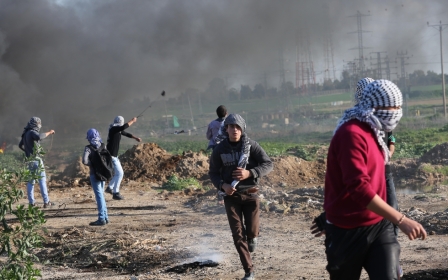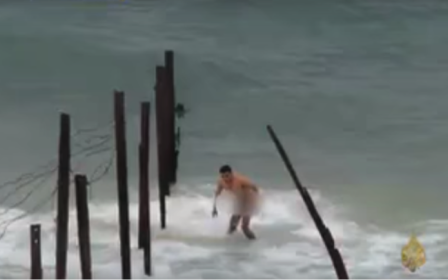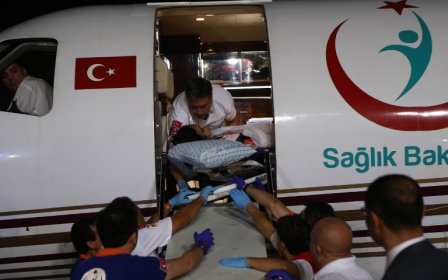Gaza under siege: The conditions of slavery

Jameela couldn’t stop repeating it over and over. “I will never leave Gaza again, I will never leave you alone, no matter what. No matter what happens to my family in Morocco.”
Wrapping both her children in her arms now that she was back in Jabalia refugee camp in northern Gaza, her promise turned into an uncontrollable chant.
It was mid-October 2015. She had just endured 40 days in limbo in the Egyptian North Sinai town of el-Arish, waiting there with hundreds of stranded Palestinians for the sealed Rafah crossing to open so that they could return home.
With no predictable end to the agonising wait, with insufficient resources to cover an indefinite stay in el-Arish, and with shooting, danger and nightly curfews imprisoning all of them in hotels, she had faced the possibility that she might not get back to her children in the foreseeable future.
Her mother was gravely ill in Gaza. She phoned her sister the day after her arrival in el-Arish and told her in a broken voice: “If my mum dies, bury her and don’t think of me. May God and my mum forgive me.”
Nine virtually uninterrupted years into the blockade on Gaza and almost two-and-a-half years since the coup d’etat in Egypt, the Rafah crossing - the primary point of exit and entry for the vast majority of Palestinians from Gaza - has gained notoriety as one of the gates of hell. This well-founded reputation is inextricably intertwined with its role, both real and symbolic, in deadly political calculations, corruption, complicity and slavery.
Far more than a geographic barrier or a border crossing, Rafah gate has come to represent the cruelty of a dictatorship towards 1.8 million people, 70 percent of whom are women and children, 50 percent of whom under the age of 18, with 80 percent living below the poverty line.
As such, it has also come to stand for Egypt’s corrupt border administration demanding sums of up to $4,000 (the equivalent of 32,000 Egyptian pounds) from desperate Gazans for a "coordination permit" allowing them access to the outside world. As has always been the case, those with money and connections often find their way out. Those with none - the 99.99 percent - have no choice but to pay the heavy price.
After the ousting of democratically elected president Mohamed Morsi brought Abdel Fattah al-Sisi to power, Egypt's relations with Palestinians in Gaza and their de facto government headed by Hamas deteriorated dramatically. The ramifications are striking, hitting at the very lifeblood of the besieged, impoverished population. Political machinations taking vengeance on the Hamas government, viewed by the new Egyptian regime as an extension of its Muslim Brotherhood rival, are keeping Rafah gate almost entirely closed.
In 2014, the first year of Sisi’s four-year term of presidency, the border remained closed for 241 days, severely reducing the previous frequency of border openings and supplementing the crack-down on Gazan tunnels - the only escape hatch left to besieged Palestinians. This near-closure kept the fragile economy of the Gaza Strip on its knees and deepened the devastation of Gaza’s population.
As if nine years of Israeli blockade and Israel’s horrific attack in the summer 2014 weren’t enough of a punishment, 2015 extinguished the last remnants of Gazans' hope for a dignified life. In terms of border crossings, 2015 was the worst of five bad years. Last year, the border was closed for over 300 days.
The Israeli sociologist, Eva Illouz, recently compared the present circumstances of the Palestinian people to conditions of slavery. These conditions, she said, present one of the great moral questions of our time and are similar, in certain respects, to the slavery that divided the United States in the 19th century.
Her argument is simultaneously simple, shocking and readily applicable to the Gazan situation. Illouz writes “If a person or a group creates mechanisms to alienate the freedom and life of another, that person is not technically speaking a slave, but s/he is subject to conditions of slavery.”
She further suggests that when 70 percent of the Palestinian population “live in conditions in which their freedom, honour, physical integrity, capacity to work, acquire property, marry and, more generally, plan for the future are alienated to the will and power of their Israeli masters, these conditions can only be named by their proper name: conditions of slavery.”
In light of this argument and given the closure imposed by Israel on Gaza’s land crossings combined with bans on air and sea travel to and from the tiny Strip, Egypt's move of sealing the sole entry-exit point for the vast majority of Gazans decimates the most basic of their rights and their humanity, if not their very existence. By all but totally denying Palestinians freedom of movement in and out of Gaza, their ability to reunite with families, to travel to work, to study or to plan their lives, Egypt has joined Israel in imposing conditions of slavery.
Both countries, however, require a third party to cover up their grimy deeds and appearing to justify the unlimited incarceration to which they have sentenced the people of Gaza. This is the job assigned to and carried out by the Palestinian Authority (PA), headed by Mahmoud Abbas.
Overall, during the past decade, the PA has proven a woeful disaster. It has shown itself neither willing nor interested in taking responsibility for alleviating the suffering of Palestinians. When it comes to Gaza in particular, it has demonstrated that it completely lacks morality. The closure of Rafah crossing is a disclosure of the decay of PA institutions and their Oslo-inspired leadership.
Discussing Rafah crossing in an interview for al-Akhbar, Abbas shocked the vast majority of Gazans in supporting the efforts of the Egyptian army. He failed to question the suffocating closure, to cite its toll in human lives and health or to protest the disastrous impacts, both human and environmental, of the sea water canal which Egypt is constructing along its border with Gaza in order to block the tunnels and eradicate the tunnel economy.
Instead, he recognised Egypt's security needs, expressed understanding for the necessary step of demolishing Palestinian homes along the Rafah borderline and explained his inability to challenge or change that policy. Moreover, he took the opportunity to attack Hamas and accuse it of taking orders from the international leadership of the Muslim Brotherhood.
In facilitating the siege on Gaza, then, it would appear that the PA is not only seeking revenge on its rival Hamas but also on the people who brought Hamas to power in the 2006 elections and on the resistance that has persistently challenged the charade of Oslo.
By suffocating Gazans and pushing them over the edge, the PA aims to incite revolt not against the conditions of slavery imposed by Egypt and Israel but against the elected Hamas government of Gaza (in fact elected in 2006 to govern both Gaza and the West Bank).
In line with its limited, narrow political vision and in its complicity with both the occupying force and Egypt, the PA is deepening division among Palestinians and turning against its own people’s aspirations. Meanwhile, those in charge of the practical day-to-day implementation of the siege offer specious justifications for the sealed Rafah gate, be it the security situation in Sinai, the absence of PA presidential guards or, most outrageously, the risks posed by the internal Palestinian rift.
The almost unbroken closure of Rafah gate by Egyptian authority has caused pain and tragedy to countless people and families. Barring access to medical treatment, it has cost hundreds their lives, their eyesight, their health, their limbs and their bodily mobility. Others have lost visas abroad and residency rights in other countries, been forced to forfeit scholarships, work permits and other life-building opportunities.
More importantly, hundreds of thousands have abandoned hopes and dreams for a better future. In the words of one young man from Gaza describing his wishes for 2016, “My hope is to retain hope.” A simple but deeply troubling wish that indicates new levels of rising tension.
With no exit from Gaza, anything is possible. Nothing is predictable. Reactions can explode in many shapes, forms and directions and no one is safe.
- Ghada Ageel is a visiting professor at the University of Alberta Political Science Department (Edmonton, Canada), an independent scholar, and active in the Faculty4Palestine - Alberta. Her new book “Apartheid in Palestine: Hard Laws and Harder Experiences” is forthcoming with the University of Alberta Press - Canada.
The views expressed in this article belong to the author and do not necessarily reflect the editorial policy of Middle East Eye.
Photo: File picture shows the Rafah crossing (AA)
Middle East Eye propose une couverture et une analyse indépendantes et incomparables du Moyen-Orient, de l’Afrique du Nord et d’autres régions du monde. Pour en savoir plus sur la reprise de ce contenu et les frais qui s’appliquent, veuillez remplir ce formulaire [en anglais]. Pour en savoir plus sur MEE, cliquez ici [en anglais].





